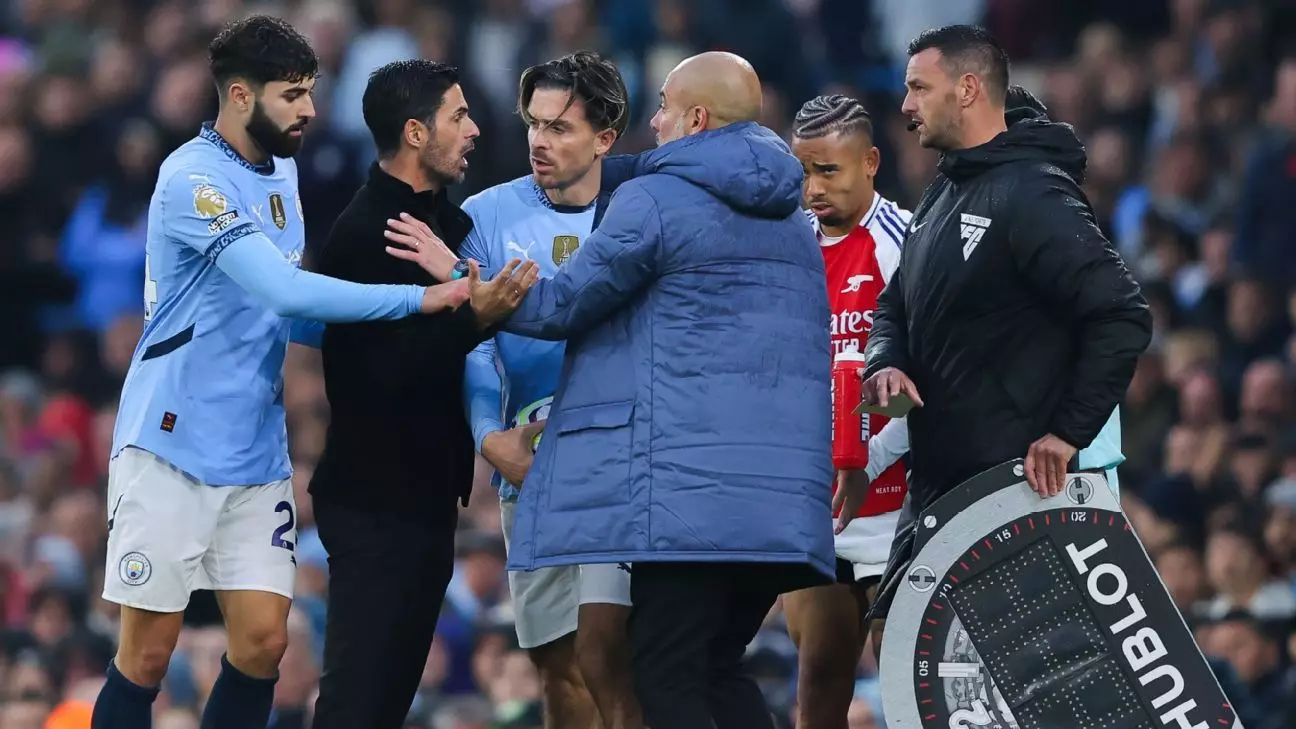The recent clash between Arsenal and Manchester City has sparked significant discussion beyond the field’s scoreline. The match ended in a gripping 2-2 draw at the Etihad Stadium, but the fallout has positioned Mikel Arteta and his team under scrutiny. Specific comments from Manchester City players about Arsenal’s tactics have turned the spotlight onto the nuances of sportsmanship and strategy in football, revealing deeper emotional currents within the game itself.
In the aftermath of the match, several City players expressed discontent regarding Arsenal’s approach. John Stones, Manuel Akanji, and Bernardo Silva articulated their belief that Arsenal engaged in what they referred to as “dark arts,” specifically citing time-wasting tactics employed to maintain a slim lead, especially after a red card reduced them to ten men. Stones remarked that Arsenal’s style might be considered “clever or dirty,” showcasing the polarized perception of tactical play that often accompanies high-stakes matches.
Such accusations highlight a critical divide in football ideology: while some view strategic manipulation of time and pace as part of the game’s intelligence, others decry it as unsportsmanlike behavior. This discrepancy in interpretation showcases the emotional investment players and fans alike have in their clubs, where every decision—tactical or otherwise—can foster feelings of betrayal or admiration.
Arteta’s response to the criticism was tempered yet pointed. He emphasized the need for facts over speculation, noting that his team is grappling with injuries that may affect their future performance. Key players like Gabriel Martinelli, alongside others who participated in the match, left the field struggling with physical strains. Specifically, goalkeeper David Raya’s injury was underscored by the sight of him leaving the stadium with a bandaged knee, a visible reminder of the physical toll such matches can take.
This injury crisis marred an already tense post-match atmosphere, leading Arteta to ponder the implications of tactical choices made under duress. Reflecting on past encounters with Manchester City, including a humiliating 5-0 loss, he noted the necessity of adapting under similar circumstances. Arteta’s assertion that every team resorts to time-wasting tactics when under pressure underscores a broader truth in sports: survival often trumps idealism.
Arteta’s strategic management choices during the match revealed a significant evolution from previous errors. He acknowledged that the experience of losing after being reduced to ten men had imparted crucial lessons. His calm assertion that they “had to play the game that we had to play” followed by their successful adaptation suggests a matured tactical repertoire. This resilience reflects a shift in Arsenal’s mentality, pivoting from naive brashness to a more calculated approach to game management.
Moreover, the narrative surrounding Arsenal’s performance indicates a burgeoning identity shaped by learning from hardships, a characteristic often found in championship-winning teams. Arteta’s insistence on the importance of growth—both as a unit and as individuals—demonstrates his vision for the team’s progression.
The post-match banter between players, most notably Erling Haaland’s advice to Arteta to “stay humble,” dismisses the notion that football exists purely within confines of civility. Instead, it illustrates the acute competitive and emotional stakes that players engage with. Arteta’s response to this banter—characterizing such exchanges as a natural component of sport—recognizes that rivalry can coexist with a professional respect while simultaneously igniting a passionate drive within teams.
Ultimately, the shift from a purely win-centric view of football to a deeper understanding of tactical nuance reflects the game’s complexity. Arguments over the legitimacy of specific strategies resonate far beyond the physical act of playing; they penetrate into the realms of ethics, culture, and identity within the sport.
The controversy surrounding the Arsenal versus Manchester City match encapsulates football’s multifaceted nature. As analysts sift through players’ comments and assess tactical approaches, the discussion extends beyond mere tactics into the landscape of player emotions, rivalries, and the evolution of teams. Arteta’s narrative emphasizes the importance of strategic adaptation while grounding these tactics within the context of players’ well-being. In these high-stakes encounters, the dialogue surrounding the so-called “dark arts” could serve as a clarion call for a renewed focus on sporting integrity, while still allowing for the inevitable ebb and flow of competitive spirit to flourish.
